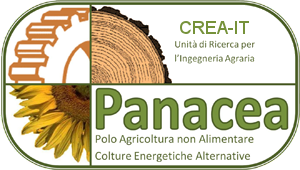The current rates of energy consumption delineate critical scenarios about the availibility of natural resources to meet and sustain the demografic and economic growth.
Considering as crucial issues as air pollution and dependence on fossil fuels, the most urgent actions are those directed towards the reduction of polluting emissions through all possible forms of savings and energy efficiency, besides to the promotion of so-called renewable sources.
Agriculture is the main source of employment and income for farmers by mens of commodities, production and enhancement of quality according to consumers requirements. However new perspective may open in the bioenergy sector.
In the last decade the European Union fastered the use of renewable biomass from agricultures for energy purpose. Such choise requires the implementation of sustainability principles which may result in multiple advantages not only for the environment, but also for the economic sector and ultimately for society. Their sustainable development must meet the needs of the present without compromising the ability of future generations to meet their own needs.
Over the years, this concept evolved torwards an idea of multiple sustainability to synthesizes the strong interconnections present in the globalized world, often conflicting each other: the increase of productivity to feed all human beings with dignity, the respect of ecosystems and the preservation of bio-diversity, the enhancement of agricultural biomass for energy purposes.
The achievement of a multiple sustainability requires a new economic model to be adepte: the bio-economy.
In February 2012, the European Commission announced its “Strategy for a sustainable bio-economy to ensure a green smart growth in Europe.” The strategy and action plan were called “Innovation for Sustainable Growth: a Bioeconomy for Europe”. The goal is to build an innovative economy, with low emissions, able to integrate the needs of a sustainable agriculture and fisheries, food security and the sustainable use of renewable biological resources for industrial purposes, while ensuring biodiversity and environmental protection. The plan focuses on three key areas: development of new technologies and processes for the bioeconomy; establishment of markets and competitiveness in the fields of bio-economy; promoting a more strictly link between policy makers and stakeholders.
Within the Europe 2020 Strategy, bioeconomy is a key element for a smart sustainable growth in Europe. Advances in bio-economy research and in the spreading of innovation should allow Europe to improve the management of its renewable biological resources and to diversifying the markets. The building of a bio-economy in Europe has a great potential: to maintain and create economic growth and employment in rural, coastal and industrial areas, while reducing dependence on fossil fuels and improving the economic and environmental sustainability of industrial production and processing.
Bio-economy concepts foresee the use of raw vegetable materials (produced in marginal lands or in rotation with food crops), food waste and agricultural residues and their transformation in renewable materials suitable for the production by means technologies, a number of bio-products (from biolubricants bioplastics, for example) having low environmental impact. This will consent the development of an innovative supply chain of bio–products involving different sectors: agriculture chemistry, processing and marketing.
The role of the Panacea group for the bio-economy.
The aim of research is to predict the changes that will be required to the means of production to respond to new needs and create sustainable innovation in the supply of raw materials, energy and environmental protection.
Panacea’s role is to provide the most update technology for helping farmer and agribusinnes in strategic decisions. The selection of such techonology occurs keeping in mind their low environmental impact and the economic return for the farmer.
The research developed by Panacea in the biomass sector is targeted to the optimization of production systems, the improving of processing and conversion technologies, the promotion of a sustainable use of raw materials.
The Panacea’s team has decades of experience in the areas related to the production, collection, transport, storage, handling, pre-treatment and processing of non-food crops.
The group is also active in dissemination of scientific outcomes sprouting from reserach project. In this way an accurate scientific information is provided to the actors of Italians agro-energy supply chains (farmer, agri-businnes, consumer). As a result, a strong contibution for a serious and constructive debate on agro-energies is furnished, avoiding NIMBY effect (not in my back yard).
Panacea group also provides services related to:
- transfer the results directly to the agro-mechanical companies and collaboration in designing prototypes for energy crops;
- collaboration with industrial groups for schedulino and developing the products, at the lowest cost and with the least environmental impact on the territory;
- technical and scientific support to central and local administrations in planning the actions on regional and national scale.
The Panacea’s work is soundly based on:
- coordination of numerous research projects funded by Italian ministries (MIPAAF, MIUR) and by European Union in different industrial. The group has acquired a depth knowledge in the field of energy crops, establishing long-lasting partnerships with European research groups acting in various scientific disciplines;
- participation at international conferences as speakers for the worldwide dissemination of the activities;
- participation in European and National Commissions;
- direct relationship with the businnes (production, transformation, processing) and partecipation in scientific committees of compagnie organizations, which has allowed the knowledge and entrepreneurial settings to influence business decisions allowing the application of technologies a lower environmental impact;
- Availability of facilities (equipments and instruments), developing of high-efficiency methodologies, patenting, selection of human resources with high knowledge and skills in the bioenergy field.



